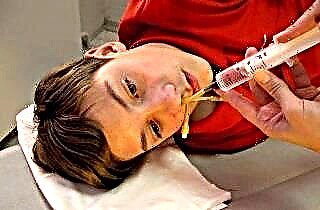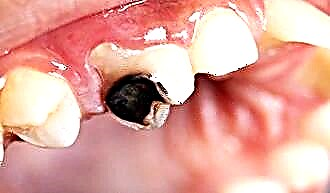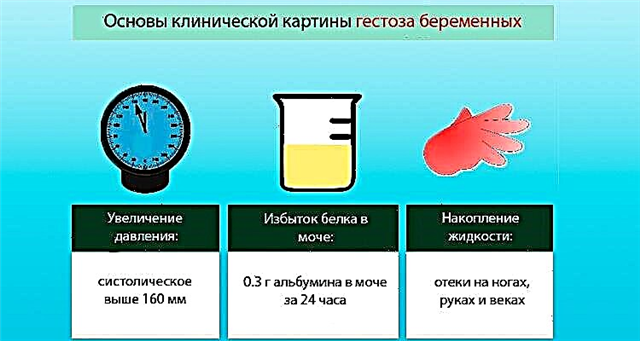Inflammation of the nasopharynx is a frequently diagnosed disease that affects both children and adults alike (in other words, this ailment is called rhinopharyngitis). The inflammatory process affects the mucous membrane of the throat and nose, contributes to the active formation of viscous mucus. Often this is accompanied by an increased temperature. In terms of symptoms, rhinopharygnitis is similar to pharyngitis and rhinitis. In most cases, it develops against their background due to improper treatment.
Symptoms
 Inflammation of the nasopharynx can be acute or chronic. Acute rhinopharyngitis develops very quickly due to viral infection (rarely, the pathogen can be bacterial). The chronic form of the disease is characterized by less pronounced symptoms. Basically, the disease is caused by fungal or bacterial pathogens and acts as a complication of the acute form. Chronic inflammation of the nasopharynx is more difficult to treat than acute.
Inflammation of the nasopharynx can be acute or chronic. Acute rhinopharyngitis develops very quickly due to viral infection (rarely, the pathogen can be bacterial). The chronic form of the disease is characterized by less pronounced symptoms. Basically, the disease is caused by fungal or bacterial pathogens and acts as a complication of the acute form. Chronic inflammation of the nasopharynx is more difficult to treat than acute.
A runny nose, pain when swallowing and other manifestations of a cold are known, perhaps, to everyone, without exception. Inflammation of the nasopharynx is accompanied by similar symptoms. Patients quickly show the following symptoms of the disease:
- nasal congestion;
- rhinitis;
- regular headache;
- perspiration, discomfort in the throat and so on.
In addition to the above symptoms, fever is diagnosed. General weakness is observed, the voice (due to nasal congestion) becomes nasal. Often, signs of rhinopharyignitis are confused with manifestations of angina. In this case, an acute sore throat also occurs, and the tonsils may become inflamed. Therefore, only a doctor should make an accurate diagnosis, otherwise the likelihood of inappropriate therapy is high.
Children (especially in preschool age) tolerate this ailment more difficult than adults. Due to the weakness of the immune system, the infection enters the body with lightning speed. At the same time, the body temperature jumps to subfebrile values (up to 39 degrees). Often it becomes the cause of cramps and abnormalities in the stomach.
Causes of the disease
Inflammation of the back wall of the nasopharynx, as a rule, occurs due to the banal hypothermia of the body. In addition, the consumption of cold drinks is an additional factor. In children, rhinopharygnitis often develops against the background of scarlet fever and measles. If we talk about the allergic form of the disease, then its appearance is due to allergens. Therefore, most often this ailment suffers in the spring, when the rapid flowering of plants begins.
 It should be noted the negative impact on the respiratory system of bad habits and bad ecology. Smoking, air pollution - these and some other factors adversely affect the condition of the nasal and pharyngeal mucosa. As a result, redness and swelling appear, the acute form of the disease is transformed into a chronic one and passes into an asymptomatic stage.
It should be noted the negative impact on the respiratory system of bad habits and bad ecology. Smoking, air pollution - these and some other factors adversely affect the condition of the nasal and pharyngeal mucosa. As a result, redness and swelling appear, the acute form of the disease is transformed into a chronic one and passes into an asymptomatic stage.
The paranasal sinuses are the first to meet viruses and prevent their spread throughout the body. Therefore, even the most common runny nose can lead to infection of the pharyngeal mucosa. All this is fraught with sore throats, flu, acute respiratory ailments that quickly affect the respiratory tract.
If you do not seek professional help in a timely manner, the acute form of inflammation is transformed into a chronic one. In addition, the following complications may appear:
- purulent sore throat;
- otitis;
- bronchitis and so on.
Diagnostics and treatment
Inflammation of the nasopharynx, the treatment of which always begins with an examination, involves examining the patient, taking anamnesis (interviewing the patient) and using the method of rhinopharyngoscopy. This procedure allows you to analyze the current state of the nasopharyngeal mucosa and determine the amount of mucus present.
To check the presence / absence of chronic rhinopharygnitis, an X-ray examination, as well as a computed tomography of the nasopharynx, is additionally prescribed.
 The nasopharynx, inflammation of which is diagnosed quite often, is treated under the guidance of a doctor. The main task is to reduce the intensity of symptoms and eliminate the inflammatory process. It is imperative to observe bed rest. In order not to provoke puffiness, it is recommended to exclude cold and hot foods, overly spicy and acidic foods from the diet. Rhinopharygnitis therapy involves the following:
The nasopharynx, inflammation of which is diagnosed quite often, is treated under the guidance of a doctor. The main task is to reduce the intensity of symptoms and eliminate the inflammatory process. It is imperative to observe bed rest. In order not to provoke puffiness, it is recommended to exclude cold and hot foods, overly spicy and acidic foods from the diet. Rhinopharygnitis therapy involves the following:
- It is necessary to regularly rinse the nose with saline. It is sold in any pharmacy, and if desired, such a solution can be easily prepared at home. To do this, we need ordinary kitchen salt (although iodized salt is still preferable). It is necessary to dissolve a spoonful of salt in one liter of warm (pre-boiled) water and instill the mixture into the nose every three hours. Washing quickly removes congestion and is well suited for even the smallest children.
- Sprays and drops for vasoconstriction last from 8 to 12 hours, but before using such drugs, you should consult your doctor. The dosage for adults and children will be different. The disadvantage of such drugs is the appearance of addiction. Therefore, their use is limited, as a rule, to 7 days. As for the allergic form of rhinopharyngitis, it is treated with antihistamines.
- To calm the pharyngeal mucosa and relieve inflammation, it is recommended to use local antiseptic drugs (lozenges, tablets). But before that, you need to clear the mucous membrane of sputum.
- Try a herbal decoction to speed up mucus. Pour one tablespoon of sage with 500 ml of regular hot water and place in a water bath. As a result, you get an infusion, which should be gargled at least 5 times a day. In addition to sage, eucalyptus, coltsfoot, licorice root helps to quickly get rid of mucus.
- Traditional medicines are also good for relieving nasal congestion. You will need to prepare beetroot juice (Kalanchoe juice can be an alternative). Drip it into both nostrils, 2 drops, and you will notice how quickly normal breathing through the nose is restored.
- Medication is used to relieve swelling. The solutions of Lugol, Yox and some others have proven themselves well.
- Physiotherapy (warming up and UHF) will help to cope with the chronic form of the disease.
Features of therapy for children and pregnant women
 The nasopharynx can become inflamed in babies and women in position. The therapy in this case will be slightly different. It should be carried out only under the supervision of doctors who carefully select medications, determine the optimal dosage, and find out the advisability of using antiviral drugs.
The nasopharynx can become inflamed in babies and women in position. The therapy in this case will be slightly different. It should be carried out only under the supervision of doctors who carefully select medications, determine the optimal dosage, and find out the advisability of using antiviral drugs.
The priority of treatment is to clear mucus from the airways and restore normal nasal breathing. For this, it is recommended to use folk remedies, but only with the permission of the attending physician. Not all medicinal herbs can be used to treat rhinopharyngitis in pregnant women, as well as children under one year old. Rinses based on the following herbal preparations have proven themselves well:
- 3 parts linden flowers and 7 parts oak bark;
- 1 part of calamus and sweet clover, 2 parts of field chamomile and 2 parts of marshmallow root;
- 1 part sage leaves, 1 part St. John's wort and peppermint, 2 parts each oregano and marshmallow root.
All of the above herbs are used to prepare infusions in a water bath (it is enough to insist for 15 minutes). 200 ml of hot water requires one tablespoon of herbs.
A common concomitant symptom of rhinopharyngitis is a dry cough. A decoction based on crushed plantain leaves will help to quickly get rid of it. Pour one tablespoon of leaves with a glass of boiling water and leave for at least 2 hours. After that, the broth is filtered and taken orally in a tablespoon 30 minutes before meals (no more than 6 times a day).
Useful Tips
Hardening is of great importance for prevention. Regular contrast showers and rubdowns help to strengthen the body's immune forces. In addition, it helps to adapt to sudden temperature changes. If possible, hardening should begin in early childhood and continue into adulthood.
 Ventilate living rooms regularly, do wet cleaning, and do not forget to wash your hands often with soap and water. Do not neglect protective masks: they will help keep you healthy during seasonal epidemics of colds and flu. Always dress for the season and the weather. Walk outside for at least 45 minutes every day.
Ventilate living rooms regularly, do wet cleaning, and do not forget to wash your hands often with soap and water. Do not neglect protective masks: they will help keep you healthy during seasonal epidemics of colds and flu. Always dress for the season and the weather. Walk outside for at least 45 minutes every day.
Morning exercises and good nutrition also have a good effect on the body. Give up semi-finished products, eat natural products, introduce vegetables and fruits into the diet. Remember to get your flu shots. All these simple tips will help protect against inflammation of the nasal and pharyngeal mucosa.
If you find the first signs of rhinopharyngitis, do not let the disease take its course and do not self-medicate. With the wrong therapy, such an ailment quickly transforms from an acute form into a chronic one, which is very difficult to cure. When you have sore throat, nasal congestion, and other accompanying symptoms of rhinopharyngitis, see your doctor. He will help determine the cause of the inflammation and make an optimal treatment strategy.



